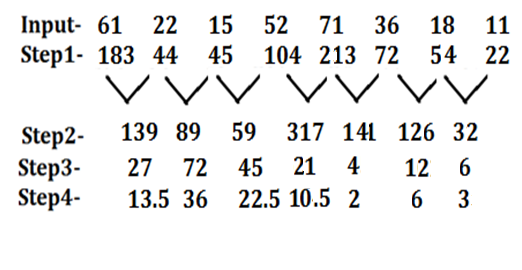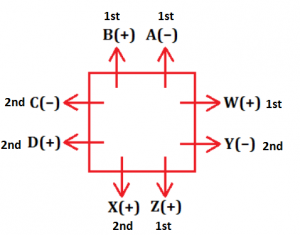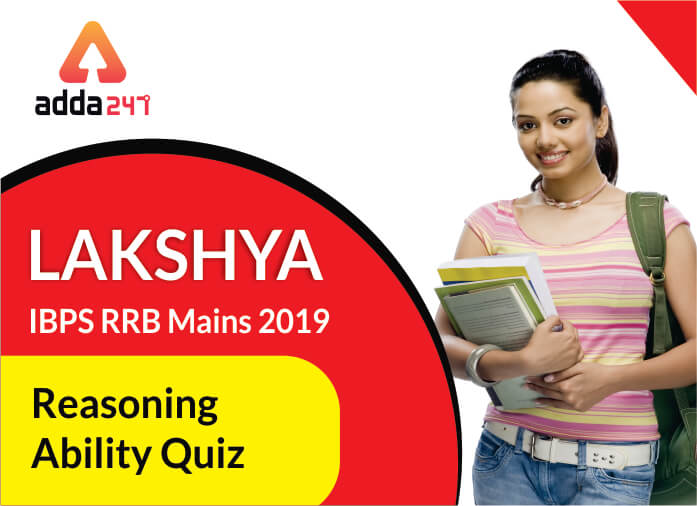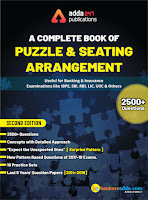Do you follow a proper plan or strategy for IBPS RRB Mains 2019? Are you aiming IBPS RRB 2019 this time? If yes, then this is the section which can help you to do wonders if practiced well. A good attempt with a mix of accuracy can help you fetch good marks. The reasoning is a game of wits and mind. It is all about logics that a question may have. Speed and accuracy are what that matters the most in this section. The only way to achieve an ambitious goal is by practicing only. So, attempt the quiz of Reasoning ability that inculcates the important questions from the important topics. Do not miss out to practice the Reasoning Ability Quiz that is being provided on Bankersadda.
Directions (1-5): Study the given information and answer the questions:
When a number arrangement machine is given an input line of numbers, it arranges them following a particular rule. The following is an illustration of an input and its rearrangement.

Step IV, is the last step of the above arrangement as the intended arrangement is obtained.
As per the rules followed in the given steps find out the appropriate steps for the given input:
Input: 61 22 15 52 71 36 18 11
Q1. What is the sum of the numbers at both the ends in step III of the given arrangement?
(a) 36
(b) 33
(c) 60
(d) 123
(e) None of the above
Q2. Which element is 2nd to the right of the one which is 4th from the left end in step I?
(a) 22
(b) 44
(c) 53
(d) 72
(e) None of these
Q3. What is the products of the numbers which is 2nd from the right end and 2nd from the left end in final step of the given arrangement?
(a) 180
(b) 72
(c) 13.5
(d) 180
(e) None of these
Q4. Which element is 2nd to the left of the one which is 4th from the left end in step II?
(a) 22
(b) 44
(c) 89
(d) 72
(e) None of these
Q5. What is the sum of the numbers at both the ends in step IV of the given arrangement?
(a) 36
(b) 63
(c) 60
(d) 16.5
(e) None of the above
Solutions (1-5):
Sol. In this input output question numbers are arranged following different rules in each step. Let us understand the logic behind it- In each step the numbers are arranged
In step 1: the numbers are multiplied with 3 and then 2 alternatively.
Step 2: the first two numbers are subtracted, then 2nd and 3rd number are added and alternatively process is repeated till the last number.
Step 3: Multiplication of the digits of the resultant in the previous step.
Step4: The numbers in the previous step is divided by 2.

S1. Ans(b)
S2. Ans(d)
S3. Ans(e)
S4. Ans (c)
S5. Ans (d)
Directions (6-10): In each of the questions given below, a group of digits is given followed by four combinations of letters/ symbols numbered (a), (b), (c) and (d). You have to find out which of the four combinations correctly represents the group of digits based on the letter/ symbol codes and the conditions given below. If none of the four combinations represents the group of digits correctly, give (e) ‘None of these’ as the answer.

Condition for coding the group digits:
(i) If the first digit is odd and last digit is even, the codes for the first and the last digits are to be interchanged.
(ii) If the first as well as the last digit is even, both are to be coded by the code for the last digit.
(iii) If the first as well as the last digit is odd, both are to be coded as ‘X’.
Q6. 285961
(a) @PD=S
(b) @∆D=S
(c) @PV=S
(d) @PD=SV
(e) None of these
S6. (a)
Sol. None of the conditions are applied.
Q7. 972486
(a) =∆@VPS
(b) S∆@VP=
(c) SD@VP=
(d) SA@P=
(e) None of these
S7. (b)
Sol. Condition (i) Applies.
Q8. 834762
(a) PMV∆SP
(b) PMV∆S@
(c) @MVA∆SP
(d) @MV∆S@
(e) None of these
S8. (d)
Sol. Condition (ii) applies
Q9. 785291
(a) ∆PD@X
(b) ∆PD@=X
(c) XPD@=X
(d) XPD@=
(e) None of these
S9. (c)
Sol. Condition (iii) applies.
Q10. 748956
(a) AVP=DS
(b) SVP=DS
(c) ∆VP=D∆
(d) SP=D∆
(e) None of these
S10. (e)
Sol. Condition (i) applies.
Directions (11-15): Study the following information carefully and answer the given questions.
A, B, C, D, W, X, Y and Z are eight friends sitting around a square table, two on each side. All of them are facing away from the centre and each is opposite to another. They all live on different floors of a two storey building with topmost floor being numbered as second and the bottommost floor being numbered as first. There are three female members and no two females are seated next to one another. Four of them live on each floor. X sits between D and Z. One of the male members whose immediate neighbours are also males lives on the topmost floor. Y is a female member who sits second to the left of X. Z is not a female member but sits opposite A, who is a female. C sits third to the left of W and is not male member. Only one female lives on the floor below the floor on which D lives.The person who sit opposite to B lives on second floor. A does not lives on topmost floor.C and D are immediate neighbours.
Q11. Who among the following is not a male member?
(a) W.
(b) X
(c) Y
(d) B
(e) None of these
Q12. Which of the following statements is true about W and X?
(a) Both are opposite to each other
(b) They do not live on the same floor.
(c) W is female, but X is a male
(d) Both are females
(e) None of these
Q13. Which of the following groups includes only females?
(a) YAW
(b) ACB
(c) XYZ
(d) ACY.
(e) None of these
Q14. Who among the following is sitting between B and the female whose immediate neighbours live below her, when counted from the right of B?
(a) A
(b) C and D
(c) C
(d) A and W.
(e) None of these
Q15. Who amongst the following pair of females lives on the same floor?
(a) DY
(b) AY
(c) AC
(d) AB
(e) None of these.
Solutions (11-15):

S11. Ans.(c)
S12. Ans.(b)
S13. Ans.(d)
S14. Ans.(d)
S15. Ans.(e)
If you are preparing for Bank exams, then you can also check out a video for Reasoning below:
You may also like to Read:





 GA Capsule for SBI Clerk Mains 2025, Dow...
GA Capsule for SBI Clerk Mains 2025, Dow...
 The Hindu Review October 2022: Download ...
The Hindu Review October 2022: Download ...
 Kamyab Divas Event: A Historic Success
Kamyab Divas Event: A Historic Success







